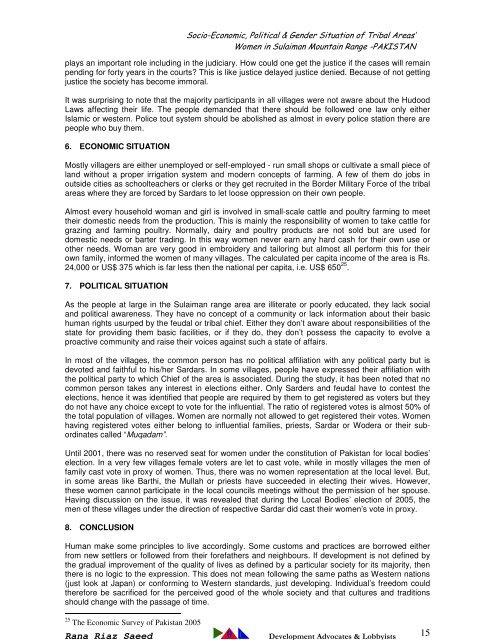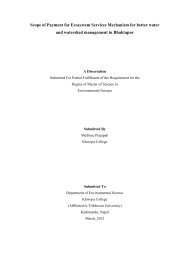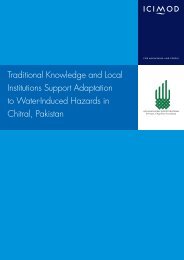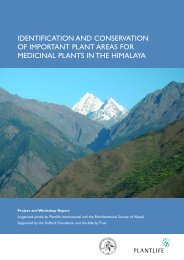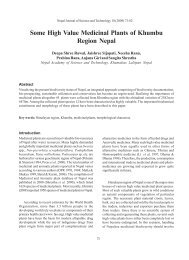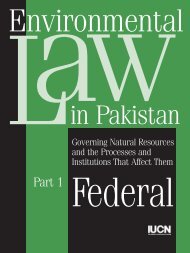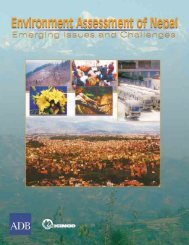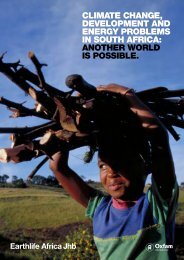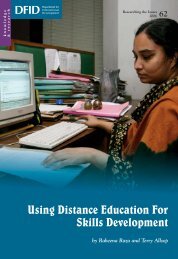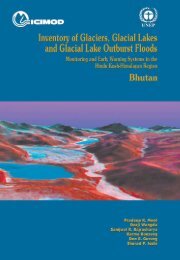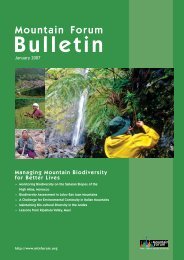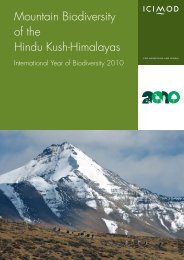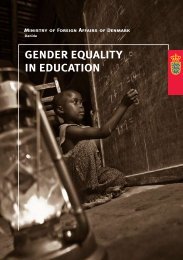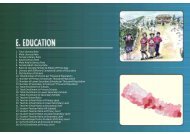Rana Riaz Saeed 1 - ResearchGate
Rana Riaz Saeed 1 - ResearchGate
Rana Riaz Saeed 1 - ResearchGate
You also want an ePaper? Increase the reach of your titles
YUMPU automatically turns print PDFs into web optimized ePapers that Google loves.
Socio-Economic, Political & Gender Situation of Tribal Areas’<br />
Women in Sulaiman Mountain Range -PAKISTAN<br />
plays an important role including in the judiciary. How could one get the justice if the cases will remain<br />
pending for forty years in the courts? This is like justice delayed justice denied. Because of not getting<br />
justice the society has become immoral.<br />
It was surprising to note that the majority participants in all villages were not aware about the Hudood<br />
Laws affecting their life. The people demanded that there should be followed one law only either<br />
Islamic or western. Police tout system should be abolished as almost in every police station there are<br />
people who buy them.<br />
6. ECONOMIC SITUATION<br />
Mostly villagers are either unemployed or self-employed - run small shops or cultivate a small piece of<br />
land without a proper irrigation system and modern concepts of farming. A few of them do jobs in<br />
outside cities as schoolteachers or clerks or they get recruited in the Border Military Force of the tribal<br />
areas where they are forced by Sardars to let loose oppression on their own people.<br />
Almost every household woman and girl is involved in small-scale cattle and poultry farming to meet<br />
their domestic needs from the production. This is mainly the responsibility of women to take cattle for<br />
grazing and farming poultry. Normally, dairy and poultry products are not sold but are used for<br />
domestic needs or barter trading. In this way women never earn any hard cash for their own use or<br />
other needs. Woman are very good in embroidery and tailoring but almost all perform this for their<br />
own family, informed the women of many villages. The calculated per capita income of the area is Rs.<br />
24,000 or US$ 375 which is far less then the national per capita, i.e. US$ 650 25 .<br />
7. POLITICAL SITUATION<br />
As the people at large in the Sulaiman range area are illiterate or poorly educated, they lack social<br />
and political awareness. They have no concept of a community or lack information about their basic<br />
human rights usurped by the feudal or tribal chief. Either they don’t aware about responsibilities of the<br />
state for providing them basic facilities, or if they do, they don’t possess the capacity to evolve a<br />
proactive community and raise their voices against such a state of affairs.<br />
In most of the villages, the common person has no political affiliation with any political party but is<br />
devoted and faithful to his/her Sardars. In some villages, people have expressed their affiliation with<br />
the political party to which Chief of the area is associated. During the study, it has been noted that no<br />
common person takes any interest in elections either. Only Sarders and feudal have to contest the<br />
elections, hence it was identified that people are required by them to get registered as voters but they<br />
do not have any choice except to vote for the influential. The ratio of registered votes is almost 50% of<br />
the total population of villages. Women are normally not allowed to get registered their votes. Women<br />
having registered votes either belong to influential families, priests, Sardar or Wodera or their subordinates<br />
called “Muqadam”.<br />
Until 2001, there was no reserved seat for women under the constitution of Pakistan for local bodies’<br />
election. In a very few villages female voters are let to cast vote, while in mostly villages the men of<br />
family cast vote in proxy of women. Thus, there was no women representation at the local level. But,<br />
in some areas like Barthi, the Mullah or priests have succeeded in electing their wives. However,<br />
these women cannot participate in the local councils meetings without the permission of her spouse.<br />
Having discussion on the issue, it was revealed that during the Local Bodies’ election of 2005, the<br />
men of these villages under the direction of respective Sardar did cast their women’s vote in proxy.<br />
8. CONCLUSION<br />
Human make some principles to live accordingly. Some customs and practices are borrowed either<br />
from new settlers or followed from their forefathers and neighbours. If development is not defined by<br />
the gradual improvement of the quality of lives as defined by a particular society for its majority, then<br />
there is no logic to the expression. This does not mean following the same paths as Western nations<br />
(just look at Japan) or conforming to Western standards, just developing. Individual’s freedom could<br />
therefore be sacrificed for the perceived good of the whole society and that cultures and traditions<br />
should change with the passage of time.<br />
25 The Economic Survey of Pakistan 2005<br />
<strong>Rana</strong> <strong>Riaz</strong> <strong>Saeed</strong> Development Advocates & Lobbyists 15


